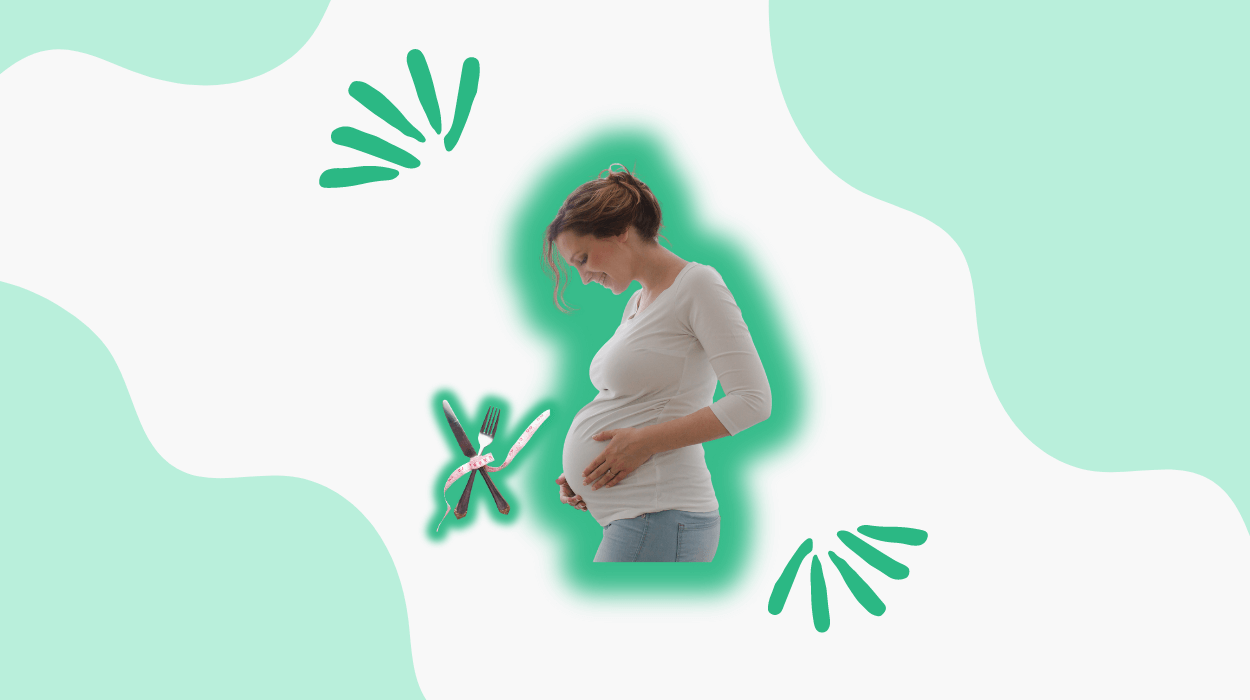

Pregnancy is a time of big changes, both physically and emotionally. While many people see it as a time to embrace those changes and focus on the health of their growing baby, some soon-to-be moms stress about gaining too much weight or dealing with existing body fat.
Trying to shed fat while pregnant might sound odd, especially when we’re usually told to expect weight gain.
In this article, I will explore what influences weight gain during pregnancy, the potential pros and cons of losing fat, and some safe ways for pregnant women to manage their weight while ensuring they and their babies stay healthy.
Amount Of Weight Gain During Pregnancy
The amount of weight accumulated during pregnancy is determined by a woman’s pre-pregnancy BMI and the number of babies she is expecting.
Underweight (BMI less than 18.5):
Healthy weight (BMI 18.5 to 24.9):
Overweight (BMI 25 to 29.9):
Obese (BMI 30 or above):

Paying attention to what and how much you eat is essential during pregnancy. Using smaller plates and utensils might help you control portions and avoid overeating.
When dining out, consider opting for smaller portions or sharing a meal to keep your calorie intake in check. You should focus on eating slowly and listen to your body’s hunger cues to prevent overeating.
Getting good-quality sleep is vital during pregnancy. It may help regulate hormones that control hunger and appetite, like leptin and ghrelin.
When you’re sleep-deprived, these hormones can get out of whack, making you feel hungrier and more likely to overeat.
Good sleep can help prevent overeating by balancing your hunger hormones and reducing the urge to snack or eat too much throughout the day.
Sleeping is also essential for processing food and turning it into energy efficiently. When your metabolism works well, you’re more likely to burn calories effectively and manage a healthy weight during pregnancy.
Stress might lead to weight gain during pregnancy, especially around your belly. When you’re stressed, your body releases cortisol hormone, which can make you crave unhealthy comfort foods and store fat in your midsection.
Mindfulness activities like meditation and yoga could help calm your mind and reduce cortisol levels. These practices involve deep breathing, gentle movements, and focusing your thoughts, which can help you feel more peaceful and in control.
Moving around helps burn calories, so you might not gain extra pounds while pregnant. Regular exercise revs up your metabolism, making it easier for your body to digest food and turn it into energy. This can stop extra fat from building up and keep your weight healthy during pregnancy.
Getting active releases endorphins feel-good hormones, which could lift your mood and lower stress. A positive outlook is good for your mental and physical health during pregnancy.
However, always talk to your doctor before starting any new exercise routine, especially if you have health concerns.
| Benefits | Description |
|---|---|
| Weight Management | Helps in controlling weight gain and promoting overall health. |
| Cardiovascular Health | Improves heart health and circulation, benefiting both mother and baby. |
| Stress Reduction | Exercise releases endorphins, reducing stress levels and promoting well-being. |
| Mood Enhancement | Physical activity can help alleviate mood swings and boost mental health. |
Eating a balanced diet is important for you and your baby’s health. Focus on nutrient-rich foods like fruits, vegetables, whole grains, lean proteins, and dairy products. Don’t forget to drink plenty of water to stay hydrated and keep your digestion on track.
Drinking green tea can be a refreshing way to stay hydrated during pregnancy. Just keep an eye on the caffeine level and stick to moderate amounts. Green tea contains antioxidants, which might help reduce inflammation and potentially support a healthy pregnancy.
Including adequate protein in your diet could help you feel full and satisfied. Aim for lean meats, poultry, fish, eggs, dairy products, legumes, nuts, and seeds to get the protein you need to stay healthy.
Avoid sugary drinks, fast food, and snacks high in unhealthy fats and sugars. Instead, choose nutrient-dense foods like fruits, vegetables, nuts, and yogurt to satisfy cravings and keep you and your baby healthy.
When considering exercises for weight loss during pregnancy, it is essential to focus on safe and beneficial activities for both the mother and the baby. Here are some recommended exercises to help manage weight during pregnancy:
During pregnancy, it is common for women to experience an increase in weight as part of the natural process supporting the growth and development of the baby.
Most women might experience a gradual weight gain of 22 to 29 lbs (10 to 12 kgs) during pregnancy, depending on the woman’s pre-pregnancy weight. This weight gain might start happening after week 20.
Pregnant individuals should prioritize seeking guidance from a registered dietitian before starting any weight loss schedule to ensure the safety and well-being of both themselves and their developing fetus.
It is essential to establish appropriate weight gain goals during pregnancy, as gaining too much weight can be just as risky as losing weight. Any weight loss during the third trimester might pose risks to both the mother and the fetus.
During pregnancy, caution should be exercised when engaging in physical activity to avoid overexertion.
Participating in exercise while ensuring adequate rest and listening to your body is recommended. If any fitness routine causes excessive strain, stopping is best to prevent harm.
Pregnancy is not the time to experiment with fad diets, as most are overly restrictive and can reduce essential nutrient intake, leading to potential complications.
When you’re pregnant and thinking about losing weight, it’s all about striking the right balance to keep you and your baby healthy.
It’s important to remember that every pregnancy is unique, so what works for one person might not be the best for another. That’s why moms-to-be must listen to their bodies, talk to their doctors, and focus on staying healthy during this particular time.
Losing weight while pregnant isn’t just about the numbers on the scale. It’s about living a healthy lifestyle that cares for both mom and baby from the inside out.
Tyler Read earned an undergraduate academic degree from Sonoma State University, California and is a certified personal trainer (CPT) with NASM (National Academy of Sports Medicine). With over 16 years of experience, Tyler has trained clients both online and in-person.
He is passionate about helping others turn their love for fitness into a career. Tyler has worked with many local and commercial gyms before establishing his successful private personal training business, which he continues to operate.
